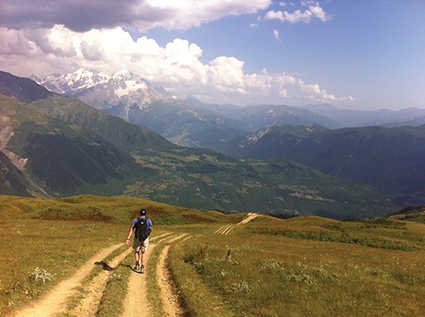Adventure, Culture & Good Food: What Foreign Tourists Expect from Georgia
Over the last few months, several articles have been published in worldwide press praising Georgia as an emerging tourism destination and encouraging tourists to come and visit Georgia now. Lonely Planet, National Geographic, BBC, the Guardian, the New York Times, the Financial Times and Bloomberg to name but a few. Only last week, CNN, the Austrian Bergwelten and the Korean Herald also wrote about Georgia.
What do these articles have in common? What did the journalists think would appeal to their European, American or Korean readers to make them consider coming to Georgia? There is a number of common themes listed below, based on the analysis of several recent articles, which indicates to foreign tourists’ expectations and motivations to travel; things which are often not very well understood by many local people working in the tourism field (accommodation, food, transport etc), particularly in the rural areas of Georgia.
• Nature: the beautiful, dazzling, snow-capped Caucasus mountains, glaciers, green valleys, pristine rivers, small and remote villages against the dramatic mountain backdrop. As the Guardian put it, “superb scenery, utterly unspoilt and great for trekking.”
• Culture: old churches and monasteries, watchtowers, museums, galleries, UNESCO World Heritage Sites (Ushguli’s appeal as “the highest village in Europe” can be found in most articles), but also intangible heritage like folk songs, dances and local festivals.
• Food and wine: unique, different, authentic and very tasty.
• Isolation, remoteness and the opportunity to disconnect (to an extent, however, because having good working Wi-Fi is also very important for tourists.
• Sense of adventure: dangerous road to Tusheti, trekking in remote areas but also off-piste or heli-skiing (off-trail, downhill skiing or snowboarding that is accessed by a helicopter).
• Hospitality of the local people, usually connected with the vast amount of local food and drink, and the opportunity to interact with them (often), despite the language barrier.
• Ease to travel: no visas for the majority of countries; many more budget flights from Europe initiated.
• Safety to travel into and around Georgia.
• Great nightlife and plenty of things to see and do in Tbilisi (vibrant, modern, cosmopolitan, but also with a beautiful Old Town, traditional balconies, old churches etc).
• There is also a sense of urgency that comes from most reports: come right now before it is too late, before it gets spoilt (ironically, by the very same people who are being encouraged to come now!)
Motivations of the Western Travellers
In October 2017, the CBI (the Agency of the Ministry of Foreign Affairs of the Netherlands) published an interesting analysis on the trends in the European outbound tourism market that perfectly sums up the points listed above: European travelers “are looking for authentic experiences in non-traditional destinations where travelers can interact with local people (…) and “destinations in developing countries with their unique cultural and natural resources” (…). A growing number of travelers are willing to pay for unique and authentic experiences, especially if it benefits local communities. Safety, sustainability and interaction with local people are important”.
Their main motivations to venture to new destinations are hiking, trekking, unspoilt nature, wildlife, the uniqueness and the “authentic experience” – that opportunity to see, smell, taste and experience the local nature, culture and cuisine.
Meeting the expectations
In addition to the need for life-changing experiences through immersion in Georgian nature and culture, there are also more basic needs of tourists once they have arrived (and, consequently, these are the things they mostly complain about if the expectations are not met). According to several employees of the Tourist Information Centres around Georgia I regularly speak to, the foreign tourists want better quality, clean accommodation; more public transport options; more diverse product offer (more “things to do when it rains”); better customer service; more food options for vegetarians; safer driving by marshrutka drivers; no smoking in public; and, last but not least, better Wi-Fi.
The number of curious and adventurous tourists arriving to Georgia is growing – but only meeting these needs will ensure that they leave satisfied.
Marta Mills is a Sustainable Tourism Specialist for the Caucasus region, advising international organisations and tourism businesses on how to manage tourism responsibly to protects its natural and cultural assets, and benefit the local population in Georgia. She writes her own blog on sustainable tourism: oneplanetblog.com and tweets at @oneplanetblog
Marta Mills












